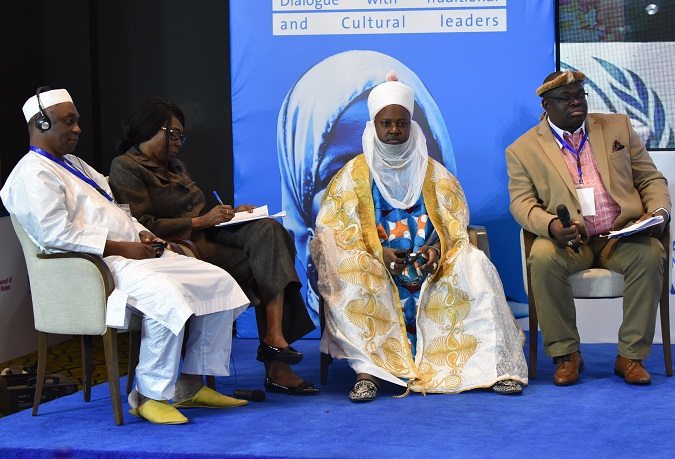Traditional and Cultural Leaders in West and Central Africa commit to End Child Marriage and FGM/C
“We have decided to break our silence, condemn in totality, stand against any form of violence and adopt a zero tolerance, to child marriage and female genital mutilation which are modern forms of slavery, brutal crimes and inhuman indignities on our children, and therefore informed by evidence shall take the following immediate measures….”Date:

Traditional and cultural leaders, from West and Central Africa, committed to ending child marriage and FGM /C in their region proclaiming the practices as backward, irreligious and demeaning to women while at the same time promoting inequality and perpetual poverty. Organized jointly with The National Council of Traditional Rulers of Nigeria, the dialogue brought together 170 traditional and cultural leaders, young women activists, child marriage and FGM/C survivors, religious leaders, and women rights activists from 26 countries.
Speaking at the event, the UN Resident Coordinator – Nigeria, Mr. Edward Kallon, stated that West and Central Africa region has the highest rates of child marriage in Africa and called on Traditional and Cultural Leaders to develop effective strategies for reversing the situation. He announced that the UN has developed a West Africa Strategy for ending child marriage and FGM/C and urged the delegates to play an important role in the implementation of the strategy.
In their declaration, the Kings acknowledged that culture is dynamic and not static. They vowed to liberate their communities from the negative cultural practices and promised to develop new norms that reinforce the dignity of Africa and its people, particularly in securing rights of children, gender equality and the role of women in the development.
The Emir of Shonga, His Royal Highness Dr. Haliru Ndanusa Yahaya applauded the initiative for involving traditional leaders who have a great potential to address challenges facing women and girls on the continent as the custodians of culture. He observed that girls and women are at the receiving end of several harmful practices which have economic, health and psychosocial impacts, and he hoped the dialogue will come up with appropriate recommendations which will ensure we end these harmful practices including child marriage and FGM/C in Africa by 2030.
Dr. Izeduwa Derex-Briggs, UN Women Regional Director for East and Southern Africa, emphasized the commitment of UN Women to ending these harmful practices by working with traditional and cultural leaders, stating that, this was the time to challenge, transform and eradicate practices that limit the potential of women and girls on the continent.
The Dialogue was part of an initiative undertaken by UN Women to galvanise and amplify the efforts and strategies carried out by Traditional and Cultural Leaders and Institutions to end child marriage, FGM/C and other harmful practices in Africa by 2030. The initiative follows a UN Women led multi-country study conducted in 2018 that targeted 10 countries in Africa, and found among other issues, the important role that culture, social norms and customary laws and practices play in hindering the enforcement of state laws and international conventions, protocols and standards and thus perpetuating child marriage and FGM/C.
The dialogue recommended the establishment of the Council of Traditional and Cultural Leaders of Africa (COTLA), a Traditional and Cultural Leaders platform for advocacy, policy dialogue, and scaling up of their efforts to transform cultural practices and social norms to end child marriage and FGM/C in Africa.
The participants represented the following countries: Liberia, Sierra Leone, Ghana, Cameroon, Niger, Cote d’Ivoire, Guinea Bissau, Guinea Conakry, Benin, Burkina Faso, The Gambia, Central Africa Republic, Mali, Togo, Senegal, Democratic Republic of Congo, Nigeria, and joined by South Africa, Morocco, Lesotho, Swaziland, Zambia, Uganda, Malawi and Zimbabwe.